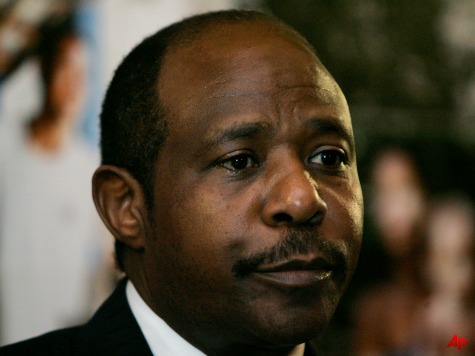
Paul Rusesabagina became a towering figure in the fight for human rights after using his position at Kigali’s Hotel des Mille Collines to save 1,268 people from the genocide in Rwanda. On the 20th anniversary of that atrocity, Rusesabagina writes that he cannot return to his country because of opposition to the government there.
Rusesabagina, who now lives in Texas, writes in the Boston Globe that he “was not invited and I am not welcome” to any commemoration of genocide in Rwanda this month. He notes that his faith in the international community faltered when he “called and called and no one came” to save the hundreds of thousands lost to genocide in his country. But what ails Rusesabagina now is the fact that he sees tensions rising in Rwanda that raise new concerns for violence. “Because I have spoken out against injustice, human rights violations, and a totally closed political space, I can’t go home to Kigali to mourn our losses and celebrate our gains,” he writes.
Rusesabagina also denounced the Rwandan government for “imprison[ing] or [assassinat]ing its political opponents” and for intervention in the Democratic Republic of Congo, where Rwanda currently “sends proxy armies… to chase Hutu rebels who then come back with conflict minerals to line their own pockets.”
Even the treatment of the genocide itself disturbs Rusesabagina. “Today, the genocide memorials in Rwanda are tourist attractions filled with bones. I wish that instead of glorifying the death of my fellow Rwandans, we had memorials to glorify the memory of their lives,” he writes.
He has also spoken out in several interviews to various international news sources. To NPR, Rusesabagina said this week that he left Rwanda in 1996 because he spoke out against more killing, and that “history repeats itself” today in Darfur, the Central African Republic, and other regions that go mostly ignored by international media or peacekeeping forces.
With Spain’s ABC, Rusesabagina was more direct about his opinion of current Rwandan leader Paul Kagame. “Rwanda is the worst dictatorship I have ever seen,” he told the newspaper. “It is an embarrassment that, 20 years later, we have learned nothing from the history that occurred in 1994.” He also tells the newspaper that his home in Belgium has been vandalized five times and that Kagame continues to call for Rusesabagina’s extradition in shaky bribery charges: “they are doing everything to have me arrested.” He warns, “Rwanda is a volcano ready to erupt at any time.”
Kagame’s government has begun an official week of mourning for those lost in the 1994 genocide. It is estimated that 800,000 to one million Rwandans, mostly of the Tutsi ethnicity, were killed during the course of about 100 days. UN Secretary General Ban Ki-Moon said this week that the organization continues to be “ashamed” for its complicity in permitting the genocide to occur with little to no intervention.


COMMENTS
Please let us know if you're having issues with commenting.